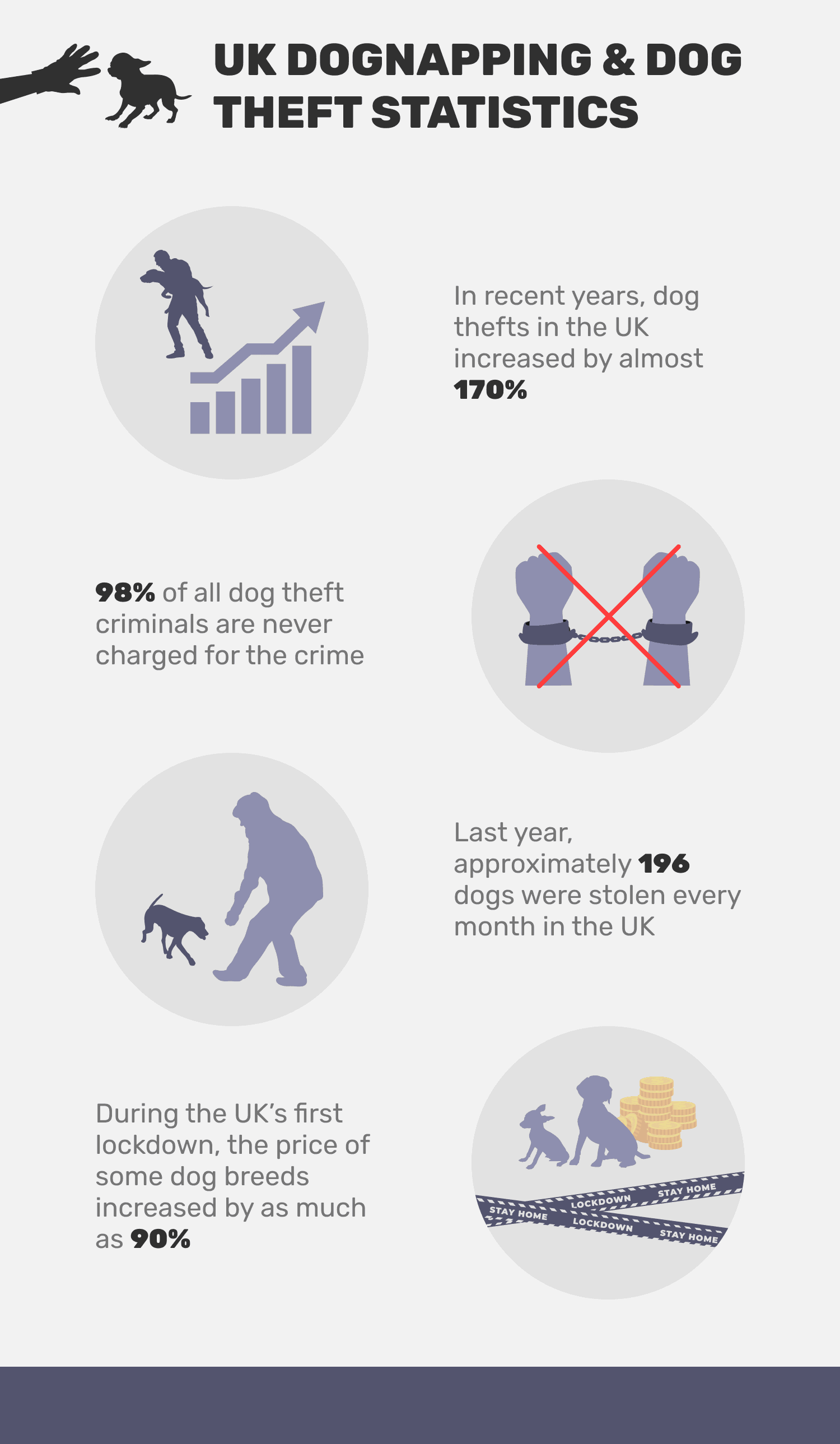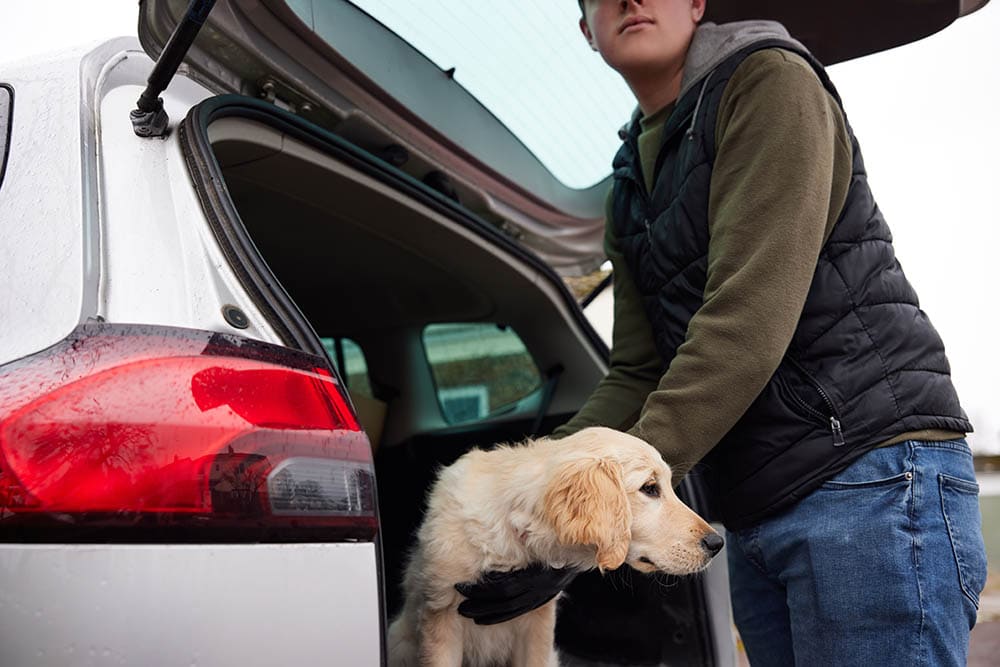Note: This article’s statistics come from third-party sources and do not represent the opinions of this website.
Although the rise in dog theft crimes in Europe and the United States has made headlines, dognapping is a serious problem worldwide. Dogs are typically sold to dogfighting clubs and unscrupulous collectors in western countries, but dog lovers in some parts of Asia have to protect their pets from being victims of illegal meat markets. Read on to learn more about dognapping and dog theft statistics in the UK.
The 8 UK Dognapping and Theft Statistics
- From 2019 to 2020, dog thefts in the U.K. increased by 170%.
- 98% of all dog theft criminals are never charged for the crime.
- In 2020, approximately 196 dogs were stolen every month in the U.K.
- The North West region experienced the highest rates of dog theft. In 2020, 335 dogs were stolen.
- Parliament received 146,638 signatures from citizens to change the Pet Theft Act of 1968.
- In 2020, 2000 dogs were reported stolen in England and Wales.
- During the U.K.’s first lockdown, the price of some dog breeds increased by 90%.
- Only 2% of dognappers are charged with a crime in the United Kingdom.

Dog Napping & Dog Theft Statistics in the United Kingdom
1. From 2019 to 2020, dog thefts in the U.K. increased by 170%.
(Time)
Lockdowns and travel restrictions forced U.K. citizens and the rest of the world to spend more time indoors during the onset of the global pandemic. Animal adoptions skyrocketed, and dog thieves took notice. The massive increase in thefts is shocking, but it’s unclear how quickly the theft rate increased in other countries like the United States. Doglost is a U.K. organization that tracks stolen pets and reunites them with their owners, but the United States does not have an advocacy group or law enforcement agency that provides new data every year. Professional and amateur pet detectives dispute the findings of the AKC and Adopt a Pet that suggests the increase in dog thefts is only anecdotal.

2. 98% of all dog theft criminals are never charged for the crime.
(The Kennel Club)
This statistic highlights the inadequacy of pet protection laws in the U.K. and other countries. When only 2% of criminals are charged and prosecuted for dog theft, other thieves are emboldened to continue and accelerate their illegal activities. The U.K. established a Pet Theft Task Force during the pandemic to respond to the rapid increase in theft, but activists insist that the problem cannot be resolved until penalties for the crime are increased and reporting of thefts becomes more consistent and transparent.
3. In 2020, approximately 196 dogs were stolen every month in the U.K.
(The Kennel Club)
Times of crisis bring out the worst in criminals, and when the world was struggling to survive in 2020, some citizens also had to deal with the devastating loss of their best friends. The increase of dog adoptions during the pandemic gave thieves more victims to target, and it also increased the number of fraudulent breeders. When criminals set up fake adoption sites, they were able to steal vast sums from locked-in victims only looking for a new pet to love during the crisis.

4. The North West region of the U.K. experienced the highest rates of dog theft. In 2020, 335 dogs were stolen.
(The Kennel Club)
The North West region accounted for 14% of the total number of dogs stolen in 2020. London had the second-highest theft rate, with 318 dogs stolen that year. Only three police forces brought charges against dog thieves in 2020—the Metropolitan Police, Cheshire Constabulary, and Kent Police.
5. Parliament received 146,638 signatures from citizens to change the Pet Theft Act of 1968.
(Petition.Parliament.UK)
With dog thefts on the rise in 2020, U.K. citizens demanded that their government increase the penalties for thieves and “reclassify the theft of a pet as a specific crime.” Although Parliament has not strengthened the Pet Theft Act of 1968, the government debated the issue on October 19, 2020, and stated that new laws would consider the emotional distress caused by thefts and increase penalties for criminals.
6. In 2020, 2000 dogs were reported stolen in England and Wales.
(gov.uk)
Most dog thefts in the U.K. occurred in the North West region in 2020. In that year, the region reported 335 dogs stolen. London experienced the second-highest number of thefts, with 318 dogs stolen in 2020. The Kent Police, Cheshire Constabulary, and Metropolitan Police were the only police departments that filed charges against dognappers in the U.K. Under the Theft Act of 1968, criminals can receive 7-year prison sentences for theft, but the sentence is based on the stolen property’s value. Dognappers typically pay a fine without going to prison.
7. During the U.K.’s first lockdown, the price of some dog breeds increased by 89%.
(gov.uk)
Demand for puppies increased during lockdowns, and the price of high-value breeds also rose. Although locked-in citizens were happy to pay inflated prices for their pets, most were unaware that dognappers noticed the price increase and became emboldened to steal more pets. Online criminals also took advantage of the high-price breeds by creating fraudulent breeding sites and adoption agencies to steal vast sums from struggling pet parents.
8. Only 2% of dognappers are charged with a crime in the United Kingdom.
(The Kennel Club)
After dog theft statistics from 2020 were reported to the U.K. public, citizens demanded that Parliament increase the penalties for pet theft. In England, a task force comprised of prosecutors, government officials, police, and local officials was created after the country’s first lockdown to combat pet theft. The task force discovered that seven out of ten pet thefts in 2020 were dogs. Parliament debated the issue in October 2020 and indicated that the penalties for pet theft would be increased sometime in the future.
Frequently Asked Questions
In most countries, dogs are considered personal property, and fines for theft are not substantial enough to discourage the crime. However, international animal rights groups and outraged dog owners have put more pressure on government bodies to change their stance on pet crimes. England has not changed their pet theft laws yet, but Parliament members have promised to enforce 3-year prison sentences for dognappers sometime in the future.
Which countries consider animals as sentient beings?
(Wikipedia)
While the U.K. does not enforce prison sentences for pet thieves, it is one of only 32 countries that considers pets as sentient beings. In November 2021, England expanded its “sentient animals” list by adding lobsters, octopuses, and crabs. Here are the countries that believe pets are sentient beings.
- Austria
- Australia
- Belgium
- Bulgaria
- Chile
- Croatia
- Cyprus
- Czech Republic
- Denmark
- Estonia
- Finland
- France
- Germany
- Greece
- Hungary
- Ireland
- Italy
- Latvia
- Lithuania
- Luxembourg
- Malta
- New Zealand
- The Netherlands
- Poland
- Portugal
- Romania
- Spain
- Slovakia
- Slovenia
- Sweden
- Switzerland
- United Kingdom
If you would like to learn more about dog theft and dognapping in the US you can read more here.
Conclusion
Criminals make hefty profits stealing animals, but they also devastate families and traumatize animals longing for their owners. Pet theft is not a new crime, but the pandemic allowed criminals to develop new methods through social media advertisements to lure victims and target citizens looking to adopt dogs online. Dognapping and animal cruelty crimes are unlikely to decrease until more countries improve prosecution rates and increase the penalties for animal crimes.
Featured Image Credit: cunaplus, Shutterstock
Contents
- The 8 UK Dognapping and Theft Statistics
- Dog Napping & Dog Theft Statistics in the United Kingdom
- 1. From 2019 to 2020, dog thefts in the U.K. increased by 170%.
- 2. 98% of all dog theft criminals are never charged for the crime.
- 3. In 2020, approximately 196 dogs were stolen every month in the U.K.
- 4. The North West region of the U.K. experienced the highest rates of dog theft. In 2020, 335 dogs were stolen.
- 5. Parliament received 146,638 signatures from citizens to change the Pet Theft Act of 1968.
- 6. In 2020, 2000 dogs were reported stolen in England and Wales.
- 7. During the U.K.’s first lockdown, the price of some dog breeds increased by 89%.
- 8. Only 2% of dognappers are charged with a crime in the United Kingdom.
- Frequently Asked Questions
- Conclusion











